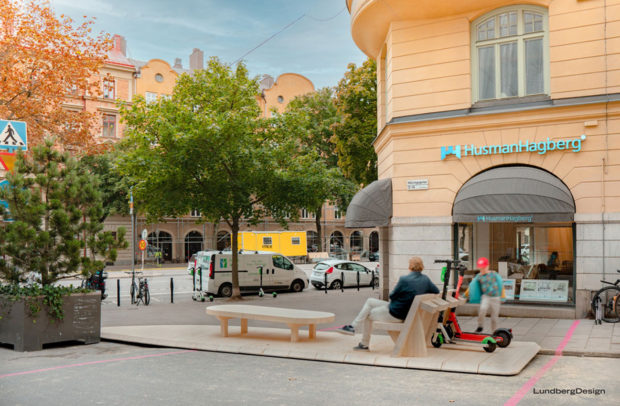
In Sweden, former car parking bays are being transformed into urban spaces that are practical, ecological and convivial. Image: courtesy of Lundberg Design
More and more major cities are opting to encourage cycling to the detriment of car use, helping to improve air quality and cut CO2 emissions. But what about all those unused parking bays? In Sweden, former car parking bays are being transformed into urban spaces that are practical, ecological and convivial.
Fewer cars and more bikes in cities means more parking bays to recycle. Many global cities are rethinking the layouts of their centers as they adapt to new urban mobility policies, as seen in Portland (USA), Barcelona (Spain) and Paris (France). In Sweden, where tens of thousands of parking bays are set to be removed, cities like Stockholm, Gothenburg, Malmö and Helsingborg are actively participating in a large-scale government plan to improve public spaces.
To this end, prefabricated modules featuring street furniture, made largely from wood, are starting to be deployed to cover over former car parking bays. Most of the time, these modules include tables, chairs, and plants, providing spaces to rest, eat, or park a bike or e-scooter. The largest modules can take the form of urban gardens or open-air gyms.
Sweden’s national center for architecture and design (ArkDes) and the Lundberg Design agency — which worked on these projects in collaboration with the residents of certain neighborhoods — drew inspiration from popular culture, and by elements seen in the worlds of Lego, Minecraft, and even in Ikea, to create these new pop-up public spaces.
This scheme forms part of a wider project called the “one-minute city,” which aims to reclaim spaces for urban dwellers so that they can enjoy their immediate neighborhoods with ease. This approach evidently recalls the “15-minute city” concept in Paris, destined to make all types of services or amenities accessible in just a few minutes. NVG
RELATED STORIES:
Upcoming Johannesburg library built with local stone, wood and mud
A vertical garden experiment aims to measure the impact of city pollution on horticulture